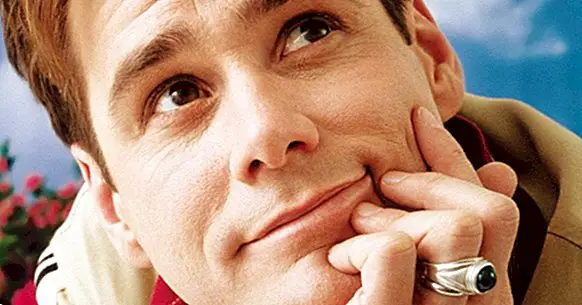20 essential films for students of Philosophy
Since ancient times, the human being has asked himself questions about who we are, why we exist, what is the meaning of life, how and why we feel, perceive, think and act and. In general, how the universe works and why it does it that way.
The visualization and reflection of these and other phenomena have generated different types of explanations , which over time have been developed and contrasted through different scientific disciplines. Not in vain, philosophy is considered the mother of all sciences.
That's why today's philosophy is still an exciting field of study that allows us to reflect on the origin of what we know today and ask about what is still unknown from different perspectives.
Twenty films with philosophical interpretations
In this article they will be released 20 essential films for philosophy students due to the deep reflection on life and the reality that can be made from them.
1. The Truman Show (Peter Weir)
This well-known film is part of the list of essentials for philosophy students due to its theme and the reflection it allows regarding their own lives. In this film we are told the life of Truman, who from the moment of his birth participates without knowing it in a reality show in the city of Seaheaven, created specifically for the reality show. All the protagonist's life is being filmed and controlled by the reality team .
Truman's life seems calm and normal until he begins to realize that what happens around him is scripted and prepared around him, being the other citizens actors and he the only totally real person in the city, with what ends trying to escape.
In the film it is reflected how the protagonist tries to know who he is and why his world is the way it is. At a philosophical level, it can serve to reflect on who we are, how we act towards others and the level of control and vigilance that we have over our own lives and what others might have.
2. Matrix (Lilly Wachawski and Lana Wachowski)
Another very well-known and relatively recent film, Matrix is a film especially philosophical that makes reference to the myth of the cave of Plato, when treating its argument of which we lived in a false reality programmed by machines. However, unlike in the myth of the cave, in Matrix the reality is devastating, being the human being harvested which plant and submitted by the illusion .
This film reflects the doubt of what is real, and how it can be seen, being another philosophical theme the search for freedom and the ability to choose. The differentiation between the experienced world and the rational world typical of Plato is also seen.
3. Origin (Christopher Nolan)
The film Origin is situated in a world where there are professionals with the ability to enter into the dreams of others , accessing other people's subconscious and working with them. The protagonist of the film is one of them, who is persecuted for his talent and for a painful past and because of it he is unable to have a normal life.
One of the works is proposed to do just wrong, with what contractor is coaxed so that instead of getting information from a person's subconscious, introduce ideas in it. The story gets complicated due to the possibility of being trapped in the world of dreams, being difficult to discern when you are awake and when inside the dream.
At a philosophical level one can ask oneself if he is really living or if what he experiences is only a dream, considering what exactly reality is and if it really is so important to know. Freedom of choice and other recurrent philosophical themes such as human mentality, guilt, doubt, the need for redemption and hope are also discussed.
4. Ikiru (Akira Kurosawa)
During this film we see how its protagonist, Kenji Watanabe, leads a monotonous life. little active and empty, which is not realized until you detect a cancer. From the diagnosis will try to find a meaning to his life and the time he has left .
Philosophically we find topics as relevant as death and fear of it, loneliness, choice and the search for a vital sense.
5. The day that Nietzsche cried (Pinchas Perry)
In this film we can see how the famous philosopher Friedrich Nietzsche has a high level of hopelessness , reason for which an appointment with the also recognized doctor Breuer, recognized professional of dynamic orientation and one of the teachers of Freud is prepared to him. Initially the therapy seems to be unsuccessful, but with the passage of time it would help to improve their situation.In the same way, the philosopher helped the doctor to cope with social pressures, and bonds of friendship between them emerged.
The melancholy, social pressure, despair and friendship are prevailing topics in the film.
6. The mechanical orange (Stanley Kubrick)
The mechanical orange is another classic with great philosophical significance . During the course of the film we see a group of gang members led by Alex, the protagonist. Together they carry out various violent and criminal acts, committing rapes and brutal beatings until, during one of them, one of the aggrieved persons dies and Alex is caught.
Afterwards, he is subjected to aversive procedures to control and prevent his violent behavior, and after the treatment the young person will visualize the consequences of his actions, taking revenge from him the people he attacked.
From a philosophical point of view, the film allows us to reflect on cruelty, violence and the desire to destroy our neighbor, as well as the consequences of our own actions. It also serves as a criticism of different theoretical models, such as behaviorism.
As in other films and works by Kubrick, one can also see a critique of the progressive technologicalization of human activity, dumbing down the mass media and making them little aware of reality, as with Alex's parents.
7. The seventh seal (Ingmar Bergman)
This film is set in the Middle Ages, at the time when Blovk, a Swedish knight who participated in the Crusades . At a specific moment the knight meets death, which has gone to look for him. The gentleman proposes a game of chess, during which they will go remembering aspects of his life and reflecting on the fears, doubts and questions that he has been doing throughout his life.
As in the case of the previous film, in this film we are put to think about death and vital boredom. It also talks about what it means to live and die, hedonism, love or innocence.
8. The Purple Rose of Cairo (Woody Allen)
This film is about the sad story of a woman during the Great Depression , using the cinema as a method of evasion in the face of sadness and a life that does not satisfy it. On one of the occasions when he goes to the cinema, one of the characters in the fiction looks at it and accesses the real world through the screen, and shortly after they start a romantic relationship on both sides of the screen. However, the producer of the film learns and elaborates a plan in order to return everyone to their world.
Again the theme of freedom of choice, the way to face reality and the distinction between reality and fantasy are some of the philosophical elements seen in this film.
9. Lives counted (Jill Sprecher)
It is a film divided into thirteen parts , in which five different people live their lives while trying to be happy and reflect on who they are, where they want to go and how they try to achieve it.
In this film we analyze the search for happiness, hope and connectivity between people and phenomena.
10. Cartesius (Robert Rosellini)
It is a film centered on the figure of René Descartes. In it we see how throughout his life the thinker tried to justify reason as the basis of thought. The philosophical interest of this film is the visualization and deepening in the thoughts of the well-known philosopher, as well as the type of life that led him to reflect in that way.
11. Waking Life (Richard Linklater)
Another work of great philosophical significance. During the movie we see how the protagonist character is in a permanent state of lucid dream as a result of an outrage . In this state he proceeds to reflect on different issues such as the meaning of life and the desire to live, reaching conversations with different thinkers of history when trying to solve their doubts.
This film reflects dreams, the meaning of life and thought from very different perspectives, visualizing different philosophical currents.
12. 2001: A Space Odyssey (Stanley Kubrick)
A cult work of science fiction, this film gathers different historical periods , from prehistory to a future in which humanity is in full space exploration.
One of the best known fragments is set in the future, in a space exploration of Jupiter in which a supercomputer seems to acquire consciousness, appearing doubt, fear and even killing one of its crew.
Evolution, intelligence and the development of technology, together with the existence of consciousness in humans and non-humans, are subjects to reflect upon after visualization.
13. The Tree of Life (Terrence Malick)
The film focuses on the eldest son of the O'Brien family, Jack, who throughout his life has seen his mother as tender and affectionate and his father as stern and serious. At 19 years of age Jack's brother loses his life, which has serious effects on family life . Years later, an adult Jack begins to ask himself profound existential questions, reflecting on the influence that his family, environment and experiences have had on his life.
It can allow reflection on thought, the effects of interaction and socialization.
14. The possible lives of Mr. Nobody (Jaco Van Dormael)
A recent film that reflects the life of the last mortal human in a world in which the majority of human beings have left that condition thanks to the advances of science. Near to death, Mr. Nobody thinks, remembers and imagines a series of possible situations that could have come to live If I had decided on certain courses of action.
Freedom and choice, as well as love and the meaning of life, are themes on which the film allows reflection.
15. Blade Runner
One of the great classics of science fiction , in this film we see how society has evolved to create replicants, robots initially thought of as slaves until they rebelled, a rebellion that resulted in their exile. Many of these replicants return, ignoring some of them that are not human. The Blade Runners are a police team dedicated to destroy them, among which is the protagonist of the story ..
Consciousness, perception, inequality and rejection, incomprehension and fear go hand in hand in this film, being observable themes and later debatable after visualization.
16. The butterfly effect (Eric Bress and Mackye Gruber)
This film stars Evan, a young man traumatized by painful past events . Through reading, the young man discovers a way to go back in time and change some of the events that marked his life, with what the future differs. However, fixing one of the events can cause other consequences that are as painful or more painful than what originally occurred.
Some of the philosophical themes covered in this film are the passage of time, destiny, action and choice and remorse.
17. V of Vendetta (James McTeigue)
This film is about V, an extravagant and intellectual man who is dedicated to fight against the tyranny of the dystopian society in which his life is spent, seeking revenge through the destruction of the political system.
Corruption, politics and the search for freedom are present themes in the film.
18. The Fight Club (David Fincher)
This film is about the life of an insomniac and empty young , who after meeting a soap salesman decides with him to found a secret fight club, based on the thought that only pain makes life worthwhile and in which members can download their frustration.
This film can serve to reflect on the subject of pain, the appreciation of life from different perspectives, knowing and perceiving what is real, how we think and how all this affects our lives.
19. Artificial intelligence (Steven Spielberg)
What is the human being and from what point can we consider that something is alive or is it real? are some of the topics that can be explored in this film.
The plot is based on David, a robot child created and programmed with the capacity to love in a world where the only thing that makes humans and robots different are feelings. Despite its creation, people are not able to accept it, so the little robot will try to find the answer of who he is.
20. Sea inside (Alejandro Amenábar)
The story told in this film, based on real events, narrates the life of Ramón Sampedro and his search for euthanasia after decades of being prostrate in a bed because of an accident.
Freedom of choice, the right to life and to dispose of one's own death and suffering are central themes of this film.



















